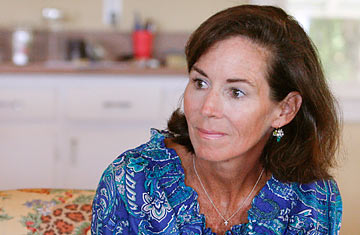
Jenny Sanford, wife of South Carolina Governor Mark Sanford
South Carolina Governor Mark Sanford was cheap, terrible at giving presents, attention-hungry, unsettled and ultimately not true to his ideals. Oh — and he cheated on his wife. The last part we know from his overwrought confession on national TV. The rest we know because the wife he cheated on tells us about it in her new memoir, Staying True.
But Jenny Sanford is not one of those scorned wives spewing bile all over her former spouse. She strives to put the unflattering revelations in context. Her soon-to-be ex-husband was ambitious and also restless because his father's death at a youngish age taught him that life was short. He was frugal because after his father died, he went through a colossal struggle to save the family's land. He became an attention junkie after his come-from-nowhere win made him a media darling and a party hero. And staying true to his ideals was almost impossible in Washington, where he spent three terms in Congress — and where horse-trading is the only way to get things done.
If it's possible to dish with dignity, Jenny Sanford does it. Early in their romance, Mark invited her to fly down and visit him in South Carolina. Instead of picking her up at the airport that evening, he left her a car (a stick shift) and directions to his family's remote farm 50 miles away. When she got there, he'd already left for a party. She rationalized that he wanted an independent, can-do woman — which, as a vice president at investment bank Lazard Frères, she was.
She recalls that Sanford more or less decided to run for office before she even knew which party he belonged to. But she knew his core belief: the government should be parsimonious with voters' money. His abhorrence of spending led to him sleeping in his Washington office on a futon, buying her a used bike as a combined birthday and Christmas present and returning a diamond necklace he'd purchased sight unseen — through a friend — because he ultimately decided it wasn't worth what he'd paid. Of course, none of this quite explains why he rarely remembered her birthday (Sept. 11) until after 2001.
If the aim of this book is to destroy her husband's political career, then it's almost a mercy killing. The author painstakingly details how their partnership, which started as one in which family values and a desire to make a contribution were shared, came unglued as she stayed at home to raise their children and he focused more on politics. She left her high-powered banking job in New York City and moved to South Carolina for him — willingly, she says. She ran four successful campaigns for him, more or less willingly, for no pay. She spent six years raising their four kids pretty much alone while he was in Washington. At nine-plus months pregnant, she hosted a luncheon for John McCain and a bunch of Republican bigwigs. Somewhere along the way, she believes, Governor Sanford lost the plot.
If she made a mistake, she seems to conclude, it's that she was too independent, too capable, and gave her husband too much license. The day after the birth of their fourth son, she had an operation to have her tubes tied. With her consent, he did not accompany her to the hospital, to the consternation of the nursing staff. "I suppose you could say that women are built for sacrifice," she writes.
Even after she discovered Mark's affair, she declined to vent at him, preferring to give him space to figure out how wrong he was. He did not fill the space well, pestering her for permission to see the other woman. He even asked if it would be possible to formally separate for one week, so it would be "legally permissible" for him to visit his lover. And when he was caught by the media returning from Argentina after visiting this other babe, he turned to Jenny for political advice. "Do not talk about your heart," she said. We all know how that now legendary press conference went.
Whatever the reason that prompted Jenny Sanford to write Staying True — and it remains a mystery, since she needs neither the money nor the publicity and she has said she would never run for office — the writing was not done in the heat of anger. She comes off as tough, reasonable and shrewd. Mark comes off as lost rather than evil or profligate. Perhaps her levelheadedness, so vital to him when he was campaigning, became less enticing to him when he was the incumbent. He may find himself needing a campaign manager again. It's hard to imagine many South Carolinian women who read this book being inclined to vote for Sanford in the next election. If this is revenge, it's certainly served at its coldest.
